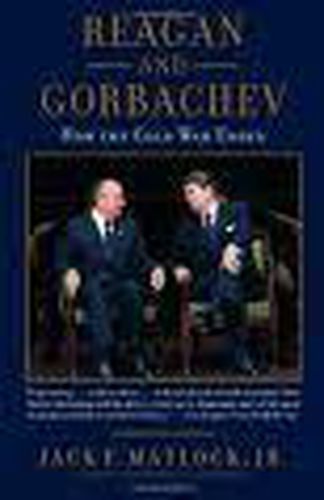Readings Newsletter
Become a Readings Member to make your shopping experience even easier.
Sign in or sign up for free!
You’re not far away from qualifying for FREE standard shipping within Australia
You’ve qualified for FREE standard shipping within Australia
The cart is loading…






In Reagan and Gorbachev, Jack F. Matlock, Jr., gives an eyewitness account of how the Cold War ended, with humankind declared the winner. As Reagan’s principal adviser on Soviet and European affairs, and later as the U.S. ambassador to the U.S.S.R., Matlock lived history: He was the point person for Reagan’s evolving policy of conciliation toward the Soviet Union. Working from his own papers, recent interviews with major figures, and archival sources both here and abroad, Matlock offers an insider’s perspective on a diplomatic campaign far more sophisticated than previously thought, led by two men of surpassing vision. Matlock details how, from the start of his term, Reagan privately pursued improved U.S.–U.S.S.R. relations, while rebuilding America’s military and fighting will in order to confront the Soviet Union while providing bargaining chips. When Gorbachev assumed leadership, however, Reagan and his advisers found a potential partner in the enterprise of peace. At first the two leaders sparred, agreeing on little. Gradually a form of trust emerged, with Gorbachev taking politically risky steps that bore long-term benefits, like the agreement to abolish intermediate-range nuclear missiles and the agreement to abolish intermediate-range nuclear missiles and the U.S.S.R.‘s significant unilateral troop reductions in 1988. Through his recollections and unparalleled access to the best and latest sources, Matlock describes Reagan’s and Gorbachev’s initial views of each other. We learn how the two prepared for their meetings; we discover that Reagan occasionally wrote to Gorbachev in his own hand, both to personalize the correspondence and to prevent nit-picking by hard-linersin his administration. We also see how the two men were pushed closer together by the unlikeliest characters (Senator Ted Kennedy and Franois Mitterrand among them) and by the two leaders’ remarkable foreign ministers, George Shultz and Eduard Shevardnadze. The end of the Cold War is a key event in modern history, one that demanded bold individuals and decisive action. Both epic and intimate, Reagan and Gorbachev" will be the standard reference, a work that is critical to our understanding of the present and the past.
$9.00 standard shipping within Australia
FREE standard shipping within Australia for orders over $100.00
Express & International shipping calculated at checkout
Stock availability can be subject to change without notice. We recommend calling the shop or contacting our online team to check availability of low stock items. Please see our Shopping Online page for more details.
In Reagan and Gorbachev, Jack F. Matlock, Jr., gives an eyewitness account of how the Cold War ended, with humankind declared the winner. As Reagan’s principal adviser on Soviet and European affairs, and later as the U.S. ambassador to the U.S.S.R., Matlock lived history: He was the point person for Reagan’s evolving policy of conciliation toward the Soviet Union. Working from his own papers, recent interviews with major figures, and archival sources both here and abroad, Matlock offers an insider’s perspective on a diplomatic campaign far more sophisticated than previously thought, led by two men of surpassing vision. Matlock details how, from the start of his term, Reagan privately pursued improved U.S.–U.S.S.R. relations, while rebuilding America’s military and fighting will in order to confront the Soviet Union while providing bargaining chips. When Gorbachev assumed leadership, however, Reagan and his advisers found a potential partner in the enterprise of peace. At first the two leaders sparred, agreeing on little. Gradually a form of trust emerged, with Gorbachev taking politically risky steps that bore long-term benefits, like the agreement to abolish intermediate-range nuclear missiles and the agreement to abolish intermediate-range nuclear missiles and the U.S.S.R.‘s significant unilateral troop reductions in 1988. Through his recollections and unparalleled access to the best and latest sources, Matlock describes Reagan’s and Gorbachev’s initial views of each other. We learn how the two prepared for their meetings; we discover that Reagan occasionally wrote to Gorbachev in his own hand, both to personalize the correspondence and to prevent nit-picking by hard-linersin his administration. We also see how the two men were pushed closer together by the unlikeliest characters (Senator Ted Kennedy and Franois Mitterrand among them) and by the two leaders’ remarkable foreign ministers, George Shultz and Eduard Shevardnadze. The end of the Cold War is a key event in modern history, one that demanded bold individuals and decisive action. Both epic and intimate, Reagan and Gorbachev" will be the standard reference, a work that is critical to our understanding of the present and the past.